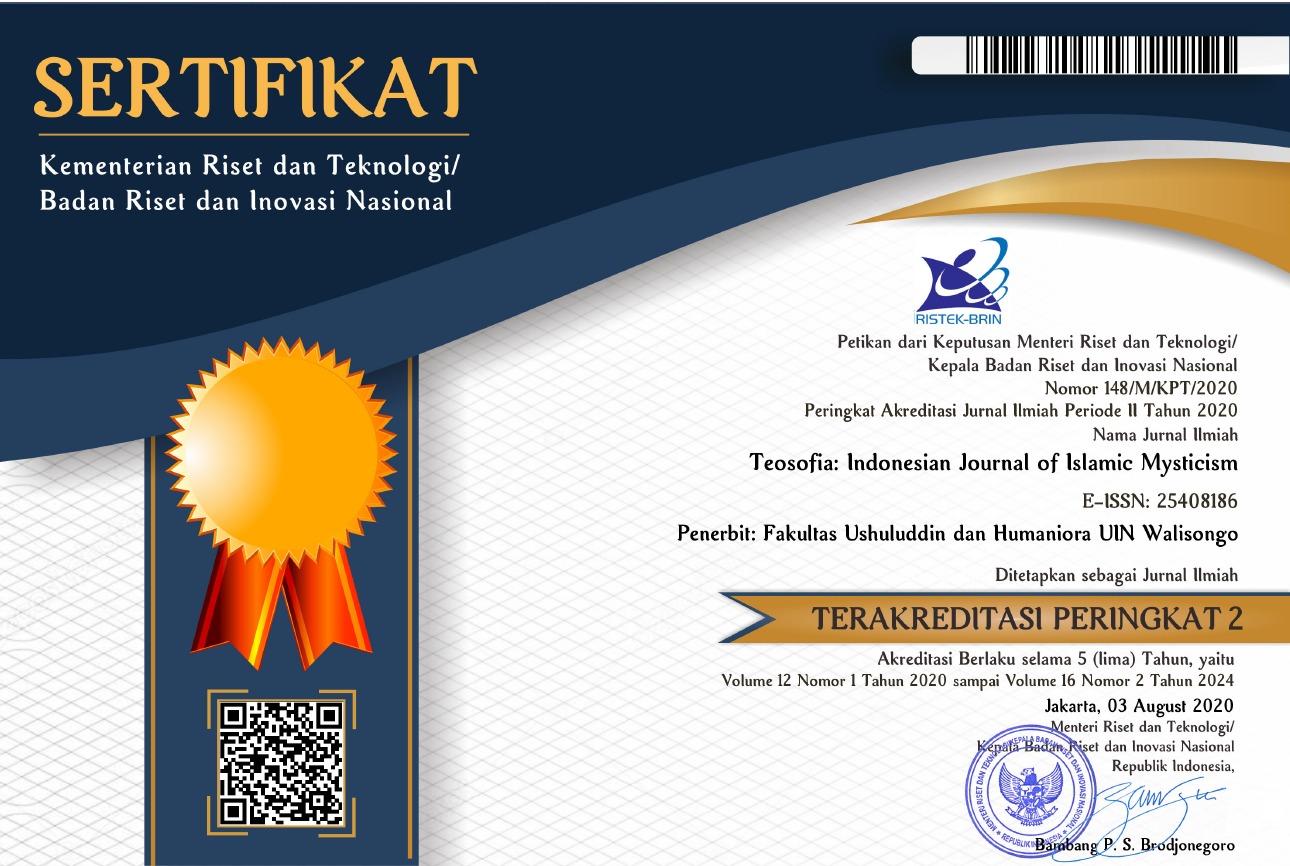M. Amin Syukur’s Socio-Sufism: Bridging Spiritual and Social Piety
DOI:
https://doi.org/10.21580/tos.v12i1.14690Keywords:
M. Amin Syukur, social Sufism, functional Sufism, humanist Sufism, social moralityAbstract
The esoteric aspect of Islam, namely sufism, can provide essential values in influencing people's views and attitudes in their lives that, in turn, motivate them to achieve their goals in life as individuals and as a collective society. This study aims to analyse sufism as part of Islamic teachings, emphasising aspects of social morality (equality, compassion, mutual help, tolerance, ukhuwwah or brotherhood) initiated by M. Amin Syukur. This study applies a qualitative method using a content analysis approach. The results discovered that M. Amin Syukur promotes social sufism, i.e., sufism that concerns social life. Such sufism has characteristics, namely humane, empirical, and functional. M. Amin Syukur's Sufistic idea is rich in human values for creating social order and good community relations.
Contribution: This study provides a new understanding that the function of sufism in society can be measured by its role, i.e. its contribution to society. Those who perform spiritual journey (sālik) must be active in all aspects of life, such as economy, politics, and society. Such Sufism by M. Amin Syukur is called social sufism.
Downloads
References
Amien, M. Masyhur. The Morality of the Development of the Perspective of Religions in Indonesia. 1st Print. Yogyakarta: Student Library, 1994.
Amen, Samsul Munir. Sufism. Jakarta : Hamzah, 2012.
Amen, Syukur. Suing Sufism and Sufism 21st Century Social Responsibility. Yogyakarta: Student Library, 1998.
Arrasyid, Arrasyid. "Sufism and the Problems of Modernity: Considering Maqamat and Ahwal Abu Nasr as-Sarraj." Journal of Fuaduna: Journal of Religious and Social Studies 4, no. 1 (30 June 2020): 70–82.
Azizy, Qodri. Education To Build Social Ethics. Semarang: Various Sciences, 2003.
Azra, Azyumardi. Muslim Intellectual Essays on Islamic Education . Ciputat: Logos, 1999.
B, Allaah. Purwakania Hasan, Psychology of Islamic Development. Jakarta : Raja Grafindo Persada, 2006.
Bekker, Anton, and Achmad Charris Zubair. Philosophical Research Methodology. Yogyakarta: Kanisius, 1983.
Dahlan, Mohamad. “Immanuel Kant's Moral Philosophical Thought (Deontology, Categorical Imperatives and Practical Ratio Postulates).” Scientific Journal of Ushuluddin Science 8, no. 1 (4 January 2009): 37–48.
Faizin, Muhammad “(PDF) Prof.'s Spiritual Journey. Dr. HM. Amin Syukur, MA: Case Study of Healing Diseases with Sufistic Therapy | Muhammad Faizin - Academia.Edu." Accessed 21 December 2022.
H.MA. Achlami, HS "Social Sufism and Solutions to the Moral Crisis." Ijtimaiyya: Journal of Islamic Community Development 8, no. 1 (1 February 2015): 90–102.
Hassan, Iqbal. Research Methodology and Its Applications. Jakarta : Ghalia Indonesia, 2002.
Hidayat, Komarudin, and Muhammad Wahyudi Nafis. Religion of the Future: Perspective of Perennial Philosophy. Jakarta: Paramadina, 1995.
Hikma, Nur. "Psychological Aspects of the Main Characters in the Novel Shoes Dahlan by Khrisna Pabichara (Abraham Maslow's Study of Humanistic Psychology)." JOURNAL OF HUMANIKA 3, no. 15 (19 May, 2017).
Idi, Abdullah, and Jamali Sahrodi. "Social Morality and the Role of Religious Education." Intizar 23, no. 1 (December 19, 2017): 1–16.
Kaelan. Qualitative Research Methods in Philosophy. Yogyakarta: Paramadina, 2005.
Khoiruddin, M. Arif. "The Role of Sufism in the Life of Modern Society." Journal of Islamic Thought 27, no. 1 (5 January, 2016).
Kumalaningsih. Research Methodology. Malang: University of Brawijaya Press, 2012.
Mas'ud, Abdurrahman. Initiating Nondichotomic Education. Yogyakarta: Gama Media, 2002.
Muhtadi, Mohammad. "Submitted to Meet the Requirements for a Doctoral Degree in Al-Qur'an-Based Education," nd
Mustadi, Mustadi. "Building Nation Morality with Sufism." Journal of Islamic Education 13, no. 2 (25 December, 2015): 20–32.
Muvid, Muhamad Basyrul, and Akhmad Fikri Haykal. "Humanistic Sufism and Its Relevance to the Spiritual Social Life of Global Century Post-Modern Society (A Study of the Sufism Thoughts of Said Aqil Siradj and Muh. Amin Syukur)." Reflection 19, no. 1 (23 June 2020).
Syukur, Amin "Values of Humanistic Islamic Education in Sufism (Study of Sufism Thought Prof. Dr. H.M. Amin Syukur, MA) - Walisongo Repository." Accessed 20 December, 2022.
Saputra, Randi, Reza Pahlevi Dalimunthe, and Mulyana Mulyana. "Balancing Rituality and Social Participation: The Concept of Social Sufism Amen Syukur " NALAR: Journal of Islamic Civilization and Thought 5, no. 1 (10 June, 2021): 14–30.
Solihin, M. The Morals of Human Sufism, Ethics, and the Meaning of Life. Bandung: Shades of Scholar, 2004.
Subaidi, Subaidi. "The Concept of Islamic Education with a Humanist Paradigm." Nadwa: Journal of Islamic Education 10, no. 1 (12 April 2017): 26–49.
Sudjatnika, Tenny. "Character Values That Build Human Civilization." Al-Tsaqafa: Scientific Journal of Islamic Civilization 14, no. 1 (2017): 127–40.
Syukur, M. Amin. Kuberserah: The True Story of Survivor Kan Ker, who was sentenced to only three months' chance to live. Semarang: Noura Books, 2012.
Syukur, M. Amin. Social Sufism. Yogyakarta : Student Library, 2004.
Thohir, Umar Faruq. "Sufism as a Solution to the Problems of Modernity: A Study of Sufism Thought M. Amin Syukur." Journal of THEOLOGY 24, no. 2 (2 March 2016): 43–68.
Yumnah, Siti, and Abdul Khakim. "The Concept of Dhikr According to Amin Syukur and Its Relevance to the Goals of Islamic Education." Oral Al-Hal: Journal of Development of Thought and Culture 13, no. 1 (29 June, 2019): 97–118.
Downloads
Published
How to Cite
Issue
Section
License
Copyright
The copyright of the received article shall be assigned to the journal as the publisher of the journal. The intended copyright includes the right to publish the article in various forms (including reprints). The journal maintains the publishing rights to the published articles. Therefore, the author must submit a statement of the Copyright Transfer Agreement.*)
Licensing

This work is licensed under a Creative Commons Attribution-ShareAlike 4.0 International License.
In line with the license, authors are allowed to share and adapt the material. In addition, the material must be given appropriate credit, provided with a link to the license, and indicated if changes were made. If authors remix, transform or build upon the material, authors must distribute their contributions under the same license as the original.
_______
*) Authors whose articles are accepted for publication will receive confirmation via email and send a Copyright Transfer Agreement.








